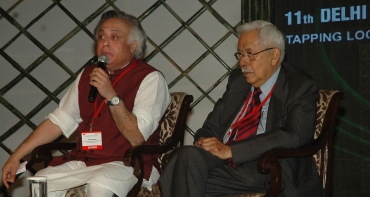In this session we are discussing how the private sector can help local sustainable development.
Ms Naina Lal Kidwai, Group General Manager and Country Head, HSBC India, speaking on the initiatives taken by HSBC
Mr. Rajiv Bawa Executive Vice President, Uninor India speaking about the growth of mobile and the potential it has in sustainable development.
90% of the worl d population now have mobile phones and the impact it has on socioeconomic growth is inarguable. There are 3 major technology move towards sustainable development. Technology have now become instrumented, interconnected and intelligent. Mobile phones are creating jobs and changing people’s lives. What we need for the future is supportive telecom regulations, enforce industry legislations and targetted investments
Ms Lakshmi Venkatachalam, Vice President (Private Sector and Cofinancing Operations), Asian Development Bank, Philippines speaking about the ADB initiatives and practices.
Mainstreaming the practice of inclusive business is required.









